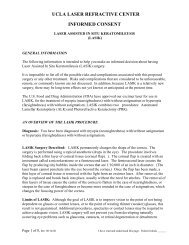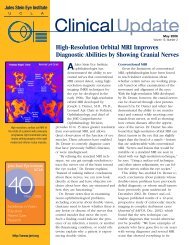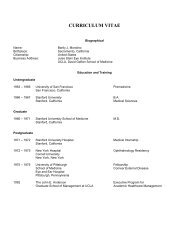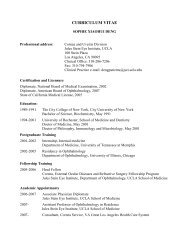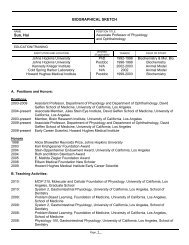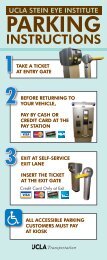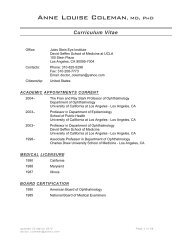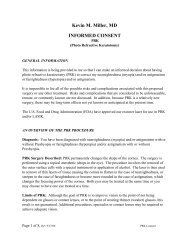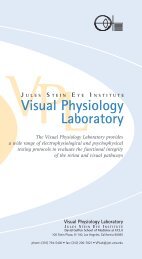View Annual Report - Jules Stein Eye Institute
View Annual Report - Jules Stein Eye Institute
View Annual Report - Jules Stein Eye Institute
Create successful ePaper yourself
Turn your PDF publications into a flip-book with our unique Google optimized e-Paper software.
Orbital Disease Center<br />
The Orbital Disease Center, under the direction of<br />
Dr. Robert Alan Goldberg, was founded in 1991.<br />
The Center brings multidisciplinary expertise to the<br />
treatment and study of orbital diseases arising from<br />
trauma, cancer, inflammation, and infection. Care is<br />
organized around a team of experts in ophthalmology,<br />
neuroradiology, neurosurgery, head and neck surgery,<br />
radiation oncology, and craniofacial surgery, bringing<br />
to the treatment of orbital diseases a depth of knowl-<br />
edge and experience not available elsewhere in<br />
Southern California.<br />
The Center provides both medical and surgical management<br />
of orbital diseases; however, surgery is the primary<br />
treatment approach. The team performs procedures in<br />
the <strong>Institute</strong>’s modern operating rooms that are not<br />
usually available in the community, including orbital<br />
decompression microsurgery for orbital apical tumors,<br />
optic canal decompression, and bony reconstruction<br />
to address traumatic or congenital defects. The Center<br />
has an active program on Graves disease. New surgical<br />
techniques are evaluated for Graves patients and basic<br />
science research is carried out to advance understanding<br />
about the disease.<br />
Vision Genetics Center<br />
Initially established in 1978 as the UCLA Retinitis<br />
Pigmentosa Registry, the Vision Genetics Center, under<br />
the direction of Dr. Michael B. Gorin, is an integrated<br />
clinical and research program that addresses the full<br />
spectrum of hereditary eye disorders. Center members,<br />
representing multiple disciplines, combine their efforts<br />
to understand the underlying molecular basis of a broad<br />
range of ocular conditions, including those involving<br />
the development of the eye, cornea, lens, extraocular<br />
muscles, retina, vitreous, and optic nerve. Areas of<br />
interest include both simple inherited conditions caused<br />
by alterations in single genes, as well as conditions in<br />
which multiple genetic variations and other risk factors<br />
play a role.<br />
The Center offers patients and their family members<br />
state-of-the art diagnosis and care of the hereditary eye<br />
or vision condition. Services include genetic counseling<br />
and, when appropriate, DNA testing either as a clinical<br />
diagnostic service, a research program, or in combination.<br />
The Center’s faculty members collaborate with a<br />
number of genetic research groups around the world<br />
to ensure that patients can participate in the most<br />
advanced research for their particular condition.<br />
Vision Rehabilitation Center<br />
The Vision Rehabilitation Center is under the direction<br />
of Dr. Melissa W. Chun with Dr. Steven D. Schwartz as<br />
medical advisor. The Center was established to provide<br />
rehabilitation to maximize visual function and quality of<br />
life of patients with low vision, defined as best corrected<br />
vision of 20/70 or worse in the better eye. These<br />
outcomes are accomplished with a rehabilitation plan<br />
tailored to each patient’s specific needs and goals.<br />
The Center provides assistance in the form of patient<br />
consultation and training, including reading and computer<br />
training, as well as evaluation with the latest<br />
low-vision devices that can help patients adapt to their<br />
visual restrictions. The Center utilizes a wide array of<br />
technologically advanced devices, such as magnifiers,<br />
telescopes, and digital and computer technology.<br />
Customized for each patient’s individual needs, ser-<br />
vices may range from simple solutions to specialized<br />
approaches. One unique feature of the Center is a<br />
special “lending library” of select low-vision devices that<br />
enables patients to try them at home or in the office<br />
prior to purchase. When appropriate, referrals are<br />
provided to assist independent living through occupational<br />
therapy and orientation and mobility training.<br />
Programs | Research and Treatment Centers 83




